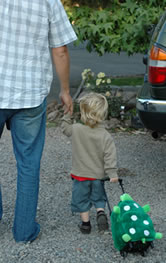By Marge Hampton
 Leaving a new baby with anyone else is perhaps the hardest task that parents face with their child. In today's world, the necessity of leaving that child for the first time may come before the baby is two months old. At this point in time, the “leaving” is much more difficult for the parents than for the child. This is true at least from an emotional point of view. If the child is left in a safe and nurturing environment and where the parent knows that the child's needs, both emotional and physical, will be met promptly the baby will do fine. Leaving a new baby with anyone else is perhaps the hardest task that parents face with their child. In today's world, the necessity of leaving that child for the first time may come before the baby is two months old. At this point in time, the “leaving” is much more difficult for the parents than for the child. This is true at least from an emotional point of view. If the child is left in a safe and nurturing environment and where the parent knows that the child's needs, both emotional and physical, will be met promptly the baby will do fine.
For the parent this particular day will be very difficult. It is helpful if both parents can be involved in taking the child on that very first day. In my experience as a director in an NAEYC accredited preschool, mothers are generally finding it very difficult to give up caring for their baby to someone else, no matter how much they trust them. In the best of situations, the caregiver will have met with the parents before that first day and explained how their day at the center will go. They listen to the parents concerns and reassure them by giving as much detail as the parents need to feel secure. As a director, I often met with the parents before they enrolled the child and helped them become secure with the program as a whole. Then I would introduce them to the caregivers in the infant room and let them give more detail about the day-to-day schedules. It is not at all unusual for the mother to cry at leaving the child, and if the father is not there to console her, it is the director's job to comfort her and let her know that she will check on the child frequently. It is also helpful to encourage the parent to call during the day to see how the child is doing. The parent has every right to expect this kind of consideration.
The caregiver's responsibility is to meet each child's needs. She needs to be sure the parents are aware of what they are to bring with the child each day. It is helpful to have the parents communicate in some way if the baby was particularly fretful during the night, or if he or she has been to the doctor and received immunizations, which might cause the baby to be more fretful. If the mother is nursing and pumping milk to send for the baby, it is sometimes helpful to ask her to bring a shirt or smock she has worn (without washing). The caregiver puts that garment between herself and the baby while she is feeding him/her. The mother's specific odors on that item of clothing will sometimes encourage the baby who is accustomed to nursing at the breast, to take the bottle more readily.
Another important aspect of the infant room is that many “firsts” occur there for the child. Parents do not like to miss out on those firsts, and I always encouraged my staff to keep those “firsts” a secret, but to inform the parent that they should be watching closely because their child is about to: sit by himself, roll over, crawl, wave “bye”, or take his first step.
It is an enormous step of faith to leave your child that first day, but if you have done your homework on finding that “perfect place” for him, you are also taking the first step to his or her journey of faith development. You communicate your trust in the situation to him or her through your words and actions, and the child knows that there are other adults in that place to care for and love him in your absence. |